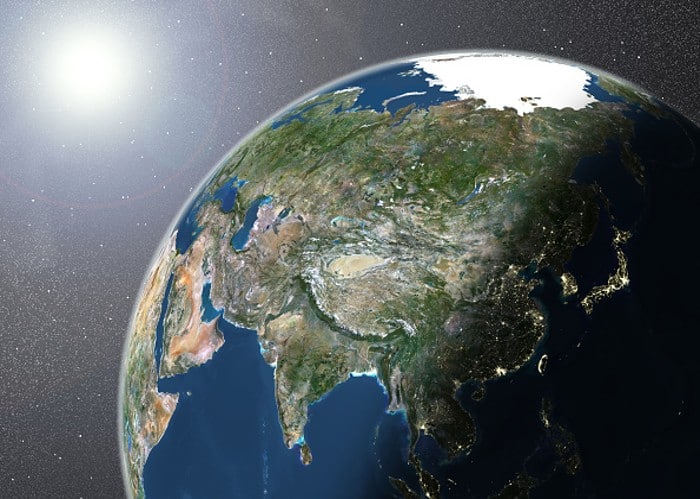A chilling new report from the world’s top climate scientists has delivered a stark warning, Earth's "vital signs" have reached a breaking point, with the future of humanity precariously hanging by a thread. This alarming revelation comes from a 2023 study published in the journal Bioscience, which scrutinized 35 key indicators of planetary health. Shockingly, 25 of these indicators, including surging carbon dioxide emissions and the unchecked rise in global population, have plummeted to unprecedented lows.
The scientists caution that the world is now venturing into an uncharted and perilous "critical and unpredictable phase" of the climate crisis. Urgent, transformative measures are desperately needed to combat these escalating threats and restore balance to Earth's ecosystems.
Earth’s temperature soars to record-breaking highs
Fueled by the relentless consumption of fossil fuels, Earth's land and ocean temperatures hit all-time highs in 2023. The report highlights that the global population is ballooning by 200,000 people daily, accompanied by the rise of 170,000 new cattle and sheep—further driving greenhouse gas emissions to record levels. The findings also spotlight 28 dangerous feedback loops, including the thawing of permafrost, which threaten to trigger catastrophic tipping points like the collapse of Greenland’s ice sheet.
Extreme weather events spiral out of control
Global warming is accelerating a cascade of extreme weather disasters, with hurricanes ravaging the U.S. and sweltering heatwaves surpassing a deadly 50°C in India. Billions of people now face unprecedented exposure to life-threatening heat. Experts warn that without rapid and decisive intervention, the human toll will be catastrophic.
"We’re already in the midst of abrupt climate upheaval," said Professor William Ripple of Oregon State University, one of the report's co-authors. "Ecological overshoot—taking more than the Earth can sustain—has pushed the planet into dangerous conditions, unlike anything humans have ever witnessed."
Climate crisis and the looming threat of societal collapse
The report further outlines the devastating impacts of climate change, which has already forced millions of people from their homes. Looking ahead, the possibility of hundreds of millions, or even billions, being displaced looms large. Such mass migration could destabilize global geopolitics, potentially leading to partial societal collapse.
Adding to the grim picture, the levels of carbon dioxide and methane, a greenhouse gas 80 times more potent than CO2 over 20 years, have reached alarming highs. Methane, produced by fossil fuel extraction, waste dumps, livestock, and rice paddies, is particularly worrisome due to its rapid growth, warns co-author Dr. Christopher Wolf.
Resistance to change hampers progress
Despite a promising 15% increase in wind and solar energy use in 2023, fossil fuels—coal, oil, and gas—remain the dominant energy sources. The report attributes this to the powerful financial interests clinging to the fossil fuel industry, stubbornly resisting the shift toward renewable energy.
A Guardian survey of hundreds of climate experts conducted in May 2023 is referenced, revealing that a mere 6% of scientists believe humanity will succeed in capping global warming at the internationally agreed 1.5°C limit. The report emphasizes the critical need to avoid even the slightest increase in global temperatures, as every fraction of a degree could expose an additional 100 million people to severe heat.
A broader ecological and social crisis
The climate emergency is only one facet of a more extensive ecological and societal breakdown, driven by pollution, environmental destruction, and growing inequality, the report asserts. Climate change, they argue, is a symptom of "ecological overshoot"—where humanity consumes resources far faster than the planet can replenish them. Without bold, systemic reforms, this will lead to mass human suffering and the destruction of ecosystems worldwide.
Time for bold, transformative action
To avert disaster, the scientists are calling for sweeping and immediate changes. Among their recommendations are measures to reduce the global population through education and the empowerment of women and girls, restoring critical ecosystems, and incorporating climate change education into global curricula.
As the world prepares for the UN’s COP29 climate summit in Azerbaijan this November, the report closes with a dire warning: only through swift, decisive action can we prevent widespread human suffering and safeguard future generations.
You may also like

'Being weak is a crime': Mohan Bhagwat at Dussehra event on violence against Hindus in Bangladesh, Kolkata rape

Yogi govt to organize Kumbh Conclave from Oct 25 to 27, to highlight vision for grand Maha Kumbh 2025

Savour a delicious slice of Spain at this tapas bar in Panjim

Robin Uthappa To Lead India In Hong Kong Cricket Sixes 2024







